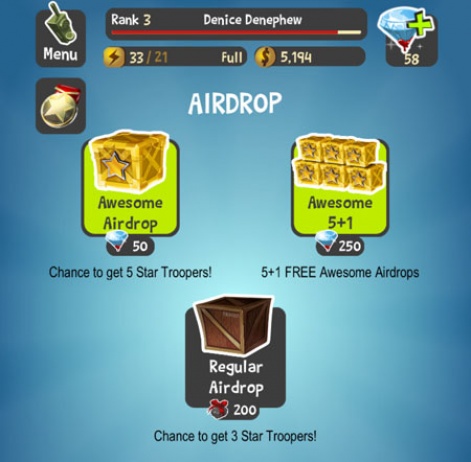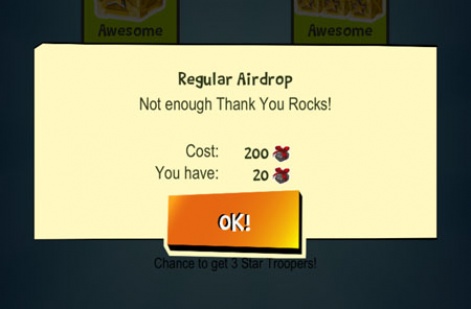Following on from my speech at the Develop in Brighton 2013 conference, we're now running a weekly column called Monetizer.
You can see previous columns here, and we're posting screens showing the different techniques we come across on our Tumblr page.
As for the concept behind Monetizer, it's an attempt to quantify the opening 5 minutes or so of significant free-to-play games to check out the early user experience and monetization techniques.
It's still a work-in-progress, though, so certain aspects are being tweaked, but that's okay, because it's about the process of analysing F2P games, not about rigorous scientific results.
You can read my handy explanation of what it's all about here.
All fired up
This week, I've been playing Kabam's iOS title Puzzle Trooper.
One of the most successful F2P mobile publishers of the past 18 months, Kabam is now expanding from internally-developed games such as Kingdoms of Camelot and Fast & Furious 6: The Game into a publishing role.
That's the background to Puzzle Trooper, which has been developed by Japanese studio Gumi (out of its Singapore office).
It's a match-3 turn-based action hybrid, which obviously takes inspiration from GungHo's massively successful Puzzle & Dragons, although Puzzle Trooper is targeted at western markets.
In terms of the basic gameplay, you control a squad of five soldiers. Each soldier unit has a different skill, while the turn-based battles are underpinned by an elemental colour system between units (sort of like a rock-paper-scissors), which provides an additional level of sophistication.
The main gameplay is, however, a match-3 grid whereby you select and move any one of the coloured circles in a single path in such a way as to make as many match-3 patterns as you can. The colour of the match-3s made then powers up your troops of that colour in the attack phase.
As you defeat the enemies, you capture them, and they are then used to level up and evolve your troops, again using the elemental colour system.
Something a bit different
As a game, this is pretty straightforward, although the path mechanic does bring a twist to the match-3 gameplay.
(Significantly, Kabam soft-launched a pure match-3 hybrid title from Chinese developer Happy Elements in late 2012, but this didn't gain any commercial success.)
Meta-game elements come as you get new troopers, although gaining elite troops via an airdrop requires spending some of the game's hard currency - diamonds.

Diamonds are also used to expand your squad capacity, buy more units for upgrading, and to refill your energy; Puzzle Trooper has an interesting energy system in that you can overfill the stated capacity.
For example, despite a 'limit' of 21 energy units, I currently have 33.
As well as diamonds, the game has two soft currencies - dollars (required for unit upgrades) and socially-earned Thank You Rocks (which are used for adding standard troopers via a regular Airdrop).
The final aspect of the game worth noting is that every time you start a mission, you can add a trooper from another player - friend or random player. After the mission, you can then add them as a friend, gaining you those Thank You Rocks.

This social element is backed by a Friends List and live global chat.
You can also play against other players head-to-head either via GameCenter or locally via Bluetooth, although the game's social aspects don't appear to be a priority. For example, the Leaderboard button is currently blacked out with the words 'Coming Soon'.
Level of success
In terms of analysing Puzzle Trooper using our three Monetizer metrics - read this article for more details - we'll start with looking at its commercial success.
Our success equation is (No. top 10 top grossing charts / No. top 100 top grossing) / US top grossing peak.
iPhone = (1/18) / 335 = 0.00016
iPad = (0/9/) / 392 = 0
Clearly since its 29 August release, Puzzle Trooper hasn't yet found a paying audience.
Indeed, even if we calculate using download positions rather than top grossing positions, it's not yet found a playing audience.
iPhone = (3/19) / 221 = 0.00071
iPad = (0/56) / 79 = 0
Spending power
Next we'll look at its Currency Discount Ratio.
This is a measure of how much more a player who buys the maximum IAP gets in terms of in-game currency compared to the smallest transaction - on a per unit basis.
For Puzzle Trooper, the D ratio is 1.2, which is low compared to most games.
For example, Kabam's Fast & Furious 6: The Game has a ratio of 1.6, while EA/PopCap's Plants vs Zombies 2 has a ratio of 2.7.
Structural analysis
Finally, we look at our Monetizer coefficient. Again for more details about this, check out our introductory article here.
Basically, we're looking to measure a game's inherent level of monetization.
The equation used is ((Maximum IAP purchase * minimum IAP purchase) / How many minutes before we're offered a hard currency transaction within first 5 minutes of play) * No. of in-game currencies.
For Puzzle Trooper, M = (($99.99 *$2.99) / 10) * 5 = 149
We take 100 as our benchmark for a high monetization level, and so treat Puzzle Trooper as a fairly high monetized game.
In comparison, Gameloft's Asphalt 8 ranked 80, Supercell's Hay Day ranked 20, while EA/PopCap's Plants vs Zombies 2 ranked 209.
Significantly, the only other Kabam game we've analysed - Blastron - also ranked 150.
Conclusion: Puzzle Trooper
Success coefficient (iPhone) = 0.00016
Success coefficient (iPad) = 0
Monetizer coefficient = 149
Currency Discount ratio = 1.2
On this basis, Kabam and Gumi have plenty of work to do if they want to make a success of Puzzle Trooper.
Most notably, although the game is fairly highly monetized, the main reason to spend cash - getting elite troops via an Awesome Airdrop - doesn't seem to have much impact on your speed of progress through the game.
Neither are the game's social features fully hooked into the gameplay.






















